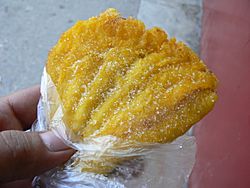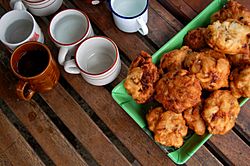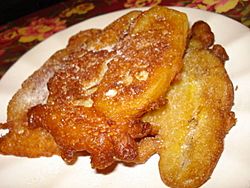Maruya (food) facts for kids
  
Top: "fanned" style maruya
Middle: "mashed" style maruya Bottom: kumbo |
|
| Alternative names | pinaypay, sinapot, baduya |
|---|---|
| Type | Fritter |
| Place of origin | Philippines |
| Main ingredients | Bananas, batter (eggs and flour), white sugar |
Maruya is a yummy fritter from the Philippines. It is usually made from a special type of banana called saba banana. Think of it like a banana pancake or a sweet banana snack!
The most common way to make maruya is by slicing bananas very thin and spreading them out like a fan. These "fanned" bananas are then dipped in a yummy batter (a mix of flour and eggs). After that, they are deep-fried until golden and crispy. Finally, they are sprinkled with sugar. Sometimes, people even add jackfruit or ice cream on top, but that's a modern twist! Maruya is a popular street food in the Philippines. It's also a favorite homemade snack called merienda for many Filipinos.
Contents
Different Kinds of Maruya
Not all maruya are made the same way! There are a few fun variations to try.
Using Different Bananas
Some versions of maruya use regular dessert bananas instead of saba bananas. These bananas are usually mashed up before being mixed into the batter. This makes the maruya soft and sweet.
Sweet Potato Maruya
Did you know maruya can also be made from sweet potatoes? This version is super tasty too! Among Muslim Filipinos, this sweet potato or mashed banana version is called jampok. They traditionally use mashed Latundan bananas for their jampok.
Regional Names and Styles
In the Bicol Region of the Philippines, maruya is known by different names like sinapot or baduya. In this area, they don't "fan" the bananas. Instead, they simply slice the bananas lengthwise before frying them in batter. In the Western Visayas region, this delicious snack is called kumbo.
Bunwelos na Saging
There's a dessert similar to maruya called bunwelos na saging. It's a type of buñuelo, which are like Spanish doughnuts. Bunwelos na saging uses more flour in its batter than maruya. It's made by mashing ripe saba bananas and mixing them with flour, egg, and sugar. Then, this mixture is deep-fried as small, round balls. It's another delicious banana treat!
 | Charles R. Drew |
 | Benjamin Banneker |
 | Jane C. Wright |
 | Roger Arliner Young |

